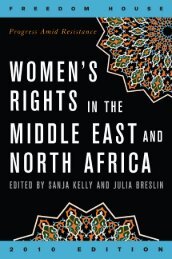Women and Politics in the Third World
Women and Politics in the Third World
Women and Politics in the Third World
Create successful ePaper yourself
Turn your PDF publications into a flip-book with our unique Google optimized e-Paper software.
INTRODUCTION 3<br />
<strong>the</strong>ir own <strong>in</strong>terests <strong>and</strong> concerns, <strong>and</strong> this activity has brought <strong>the</strong>m <strong>in</strong>to direct<br />
conflict with authoritarian regimes or movements. Their goals, as well as <strong>the</strong>ir<br />
methods of organisation <strong>and</strong> struggle, have been dist<strong>in</strong>ct from that of more<br />
orthodox male-dom<strong>in</strong>ated movements, <strong>and</strong> <strong>in</strong> some cases <strong>the</strong>y have cont<strong>in</strong>ued to<br />
struggle when o<strong>the</strong>r forms of political opposition have been drastically weakened<br />
or silenced.<br />
The role played by <strong>the</strong>se women is traced to two ma<strong>in</strong> sources. First, where<br />
<strong>the</strong>y are fight<strong>in</strong>g for <strong>the</strong>ir own rights, <strong>the</strong>y are oppos<strong>in</strong>g male authoritarianism,<br />
which both re<strong>in</strong>forces <strong>and</strong> is re<strong>in</strong>forced by state authoritarianism to vary<strong>in</strong>g<br />
degrees. Thus to <strong>the</strong> extent that any functional def<strong>in</strong>ition of democracy has to<br />
<strong>in</strong>clude <strong>the</strong> equal rights of women to control <strong>the</strong>ir own lives <strong>and</strong> participation <strong>in</strong><br />
social decisions, <strong>the</strong>ir struggle forms an essential component of democracy. S<strong>in</strong>ce<br />
women <strong>in</strong> particular are put at a disadvantage by lack of this component, <strong>the</strong>y<br />
have a special <strong>in</strong>terest <strong>in</strong> fight<strong>in</strong>g for it—except <strong>in</strong> <strong>the</strong> case of those strata of<br />
women whose privileges with<strong>in</strong> an authoritarian system outweigh <strong>the</strong> disabilities<br />
<strong>the</strong>y suffer.<br />
Second, where women have organised <strong>the</strong>mselves <strong>and</strong> fought to defend <strong>the</strong><br />
lives <strong>and</strong> welfare of <strong>the</strong>ir children, this has <strong>in</strong>volved a politicisation of <strong>the</strong><br />
traditionally ‘fem<strong>in</strong><strong>in</strong>e’ role of mo<strong>the</strong>rhood. These women have found<br />
<strong>the</strong>mselves pitted aga<strong>in</strong>st repressive, totalitarian movements <strong>and</strong> regimes, <strong>and</strong> have<br />
fought back with amaz<strong>in</strong>g courage <strong>and</strong> resourcefulness. Their ability to turn <strong>the</strong>ir<br />
maternal role (traditionally perceived as a source of weakness by most Western<br />
fem<strong>in</strong>ists) <strong>in</strong>to a reservoir of immense strength makes it imperative to look more<br />
closely at <strong>the</strong> values be<strong>in</strong>g affirmed by <strong>the</strong>se mo<strong>the</strong>rs, <strong>and</strong> to recognise <strong>the</strong>m as<br />
universal human values which ought to have a central place <strong>in</strong> any progressive<br />
movement for social change.<br />
A different perspective is provided by Jasbir K.Puar, a non-white US aid<br />
worker whose <strong>in</strong>teractions with Nicaraguan women recipients were affected by<br />
<strong>the</strong> complex politics of race <strong>and</strong> gender. Her chapter outl<strong>in</strong>es her experiences <strong>and</strong><br />
highlights <strong>the</strong> <strong>in</strong>terdependence of often helpless, <strong>and</strong> frequently hapless, young,<br />
enthusiastic, but not so well <strong>in</strong>formed, aid workers <strong>and</strong> <strong>the</strong> more experienced,<br />
but needy, local women. Their opportunities <strong>and</strong> priorities are often entirely<br />
different from those of donors. For <strong>the</strong>se women <strong>the</strong> politics of aid, like national<br />
politics, has had to be negotiated <strong>in</strong> terms of needs <strong>and</strong> possible scenarios of<br />
successful access to extremely scarce resources. They sought tangible goods ra<strong>the</strong>r<br />
than good advice.<br />
In <strong>the</strong> chapters that follow, <strong>the</strong> strategies used by women to obta<strong>in</strong> what<br />
welfare, health care <strong>and</strong> opportunities <strong>the</strong>y can from more or less powerful states<br />
is exam<strong>in</strong>ed. Us<strong>in</strong>g specific case studies from post-revolutionary or embattled<br />
states, <strong>the</strong> authors discuss <strong>the</strong> problems faced by women who have been active <strong>in</strong><br />
resistance movements or have had to come to terms with <strong>the</strong> contradictory<br />
dem<strong>and</strong>s made of <strong>the</strong>m by ideological <strong>and</strong> practical needs. <strong>Women</strong> <strong>in</strong> Ch<strong>in</strong>a,<br />
Nicaragua, Iran <strong>and</strong> Palest<strong>in</strong>e have sought to endorse much of <strong>the</strong> revolutionary<br />
ardour that led to <strong>the</strong> emergence of <strong>the</strong> state, or <strong>the</strong> resistance movement <strong>and</strong> its




